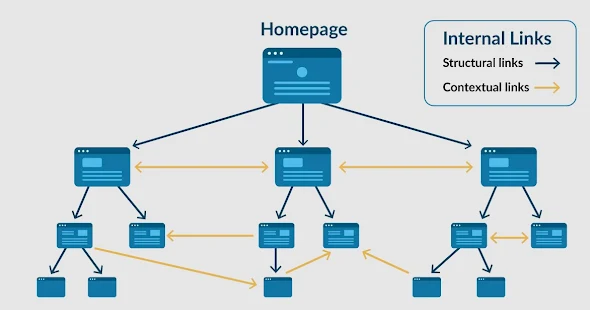Internal linking is the practice of hyperlinking to other pages within the same website. It is an essential aspect of SEO that can significantly influence a website's search engine performance and user experience. Here are some key reasons why internal linking is important for SEO:
### 1. **Improved Site Navigation**
- Internal links help users navigate a website more easily by guiding them to related content. A well-structured internal linking system enhances user experience, allowing visitors to find relevant information quickly.
### 2. **Enhanced Crawlability**
- Search engine bots use internal links to discover and index pages on a website. By linking to important pages, you ensure that search engines can crawl and understand your site structure, making it easier for them to index all relevant content.
### 3. **Distributing Page Authority**
- Internal links help distribute page authority (or link juice) throughout a website. Pages that receive more internal links are often viewed as more important, which can positively impact their rankings in search results.
### 4. **Establishing Information Hierarchy**
- Internal linking helps establish a clear hierarchy of information within your website. By linking to main pages and subpages, you can signal to search engines which pages are most important and how they relate to one another.
### 5. **Increased Dwell Time and Reduced Bounce Rate**
- By providing links to related content, internal linking encourages users to explore more pages on your site. This can lead to increased dwell time (the time a user spends on your site) and reduced bounce rates, both of which are positive signals to search engines regarding content quality.
### 6. **Boosting SEO for Low-Authority Pages**
- Internal links can help improve the visibility of less authoritative pages by linking them to higher-authority pages. This can boost their chances of ranking in search results.
### 7. **Encouraging User Engagement**
- Internal links can direct users to valuable resources, blog posts, or product pages, enhancing user engagement. Engaged users are more likely to convert, whether that means making a purchase, signing up for a newsletter, or consuming more content.
### 8. **Facilitating Contextual Relevance**
- Linking relevant content together helps search engines understand the context and relevance of your pages. This contextual linking can improve the chances of ranking for related search queries.
### 9. **Supporting Keyword Strategy**
- Internal linking provides opportunities to optimize anchor text with relevant keywords. This can help signal the content of the linked page to search engines, further enhancing SEO.
### 10. **Easier Content Updates**
- Internal links make it easier to update and manage content. When you add or modify content, you can quickly link to existing pages, ensuring that users have access to the most relevant information.
### Best Practices for Internal Linking
1. **Use Descriptive Anchor Text**:
- Choose clear, descriptive anchor text that indicates what users can expect on the linked page. This also helps search engines understand the content of the linked page.
2. **Link to Relevant Content**:
- Ensure that internal links are relevant to the content of both the linking and linked pages. This improves user experience and contextual relevance.
3. **Avoid Over-Linking**:
- Don’t overload a page with too many internal links. This can be overwhelming for users and may dilute the value of each link.
4. **Create a Logical Structure**:
- Develop a clear site structure with a hierarchy that makes sense. Use internal links to connect related content within this structure.
5. **Regularly Audit Internal Links**:
- Periodically review and update internal links to ensure they remain relevant and functional. Fix broken links and update anchor text as necessary.
### Conclusion
Internal linking is a fundamental SEO practice that plays a critical role in enhancing website navigation, improving crawlability, and distributing page authority. By implementing effective internal linking strategies, website owners can boost their site's search engine performance, improve user experience, and ultimately drive more traffic and conversions.











0 Comments